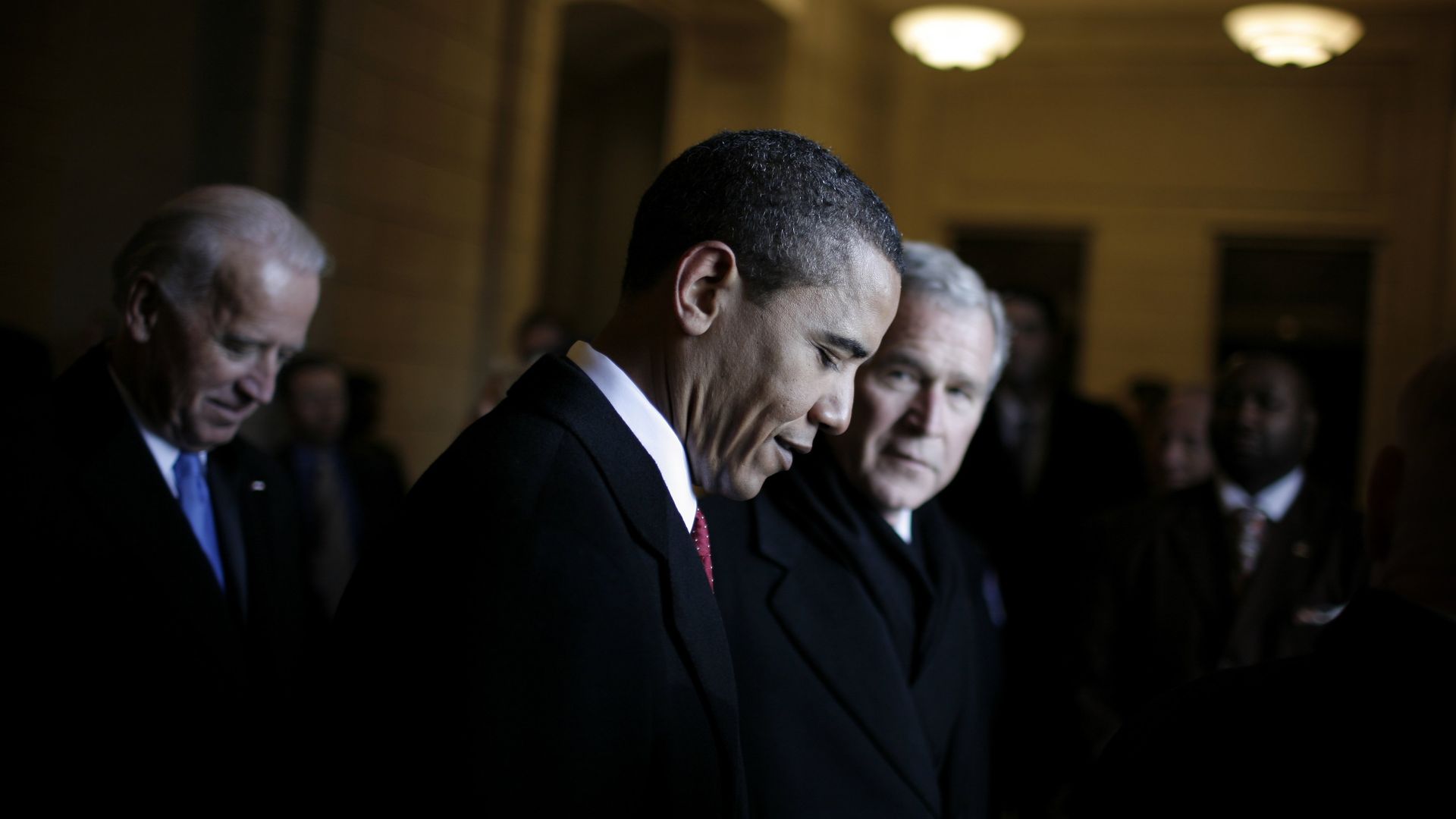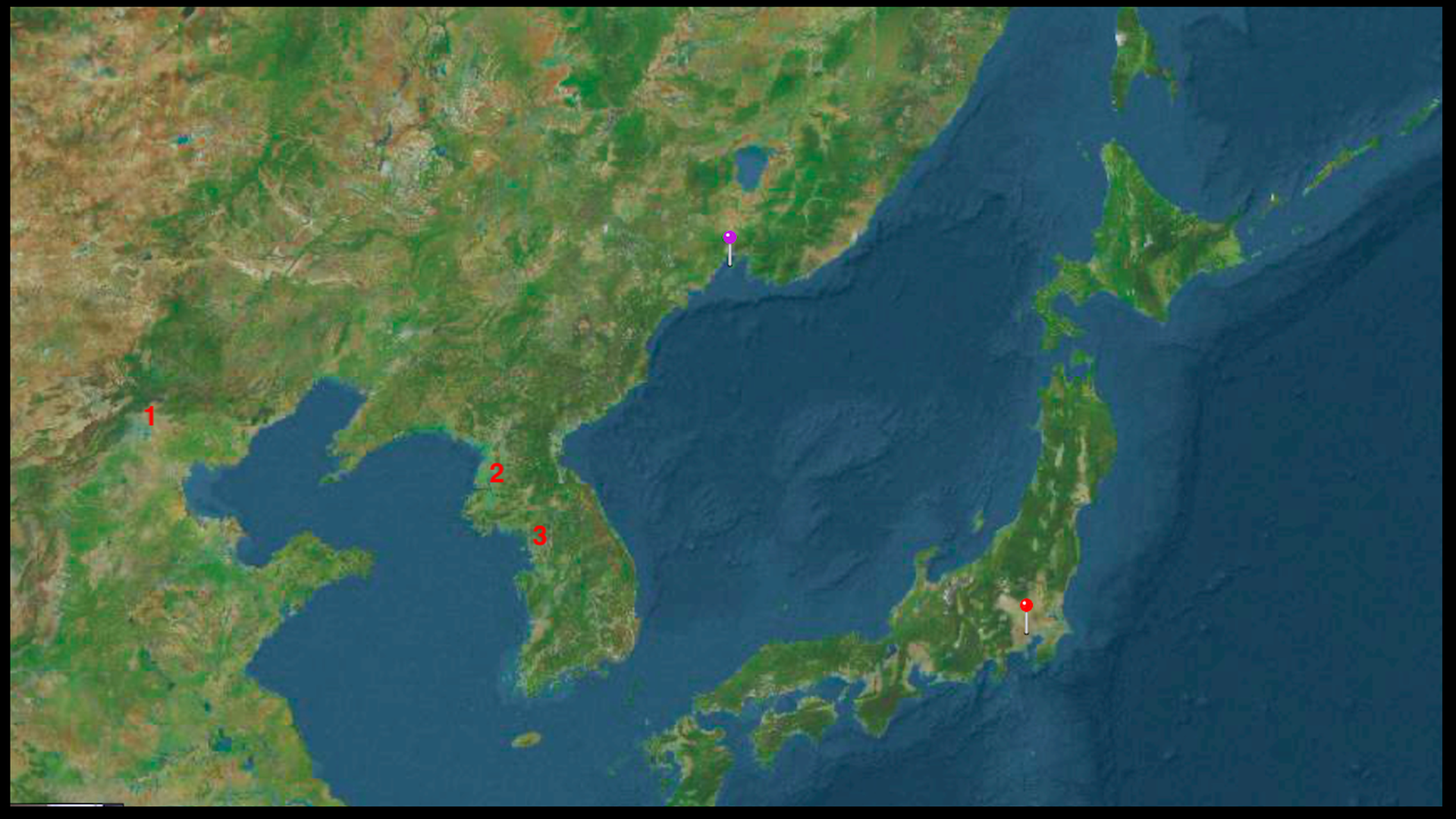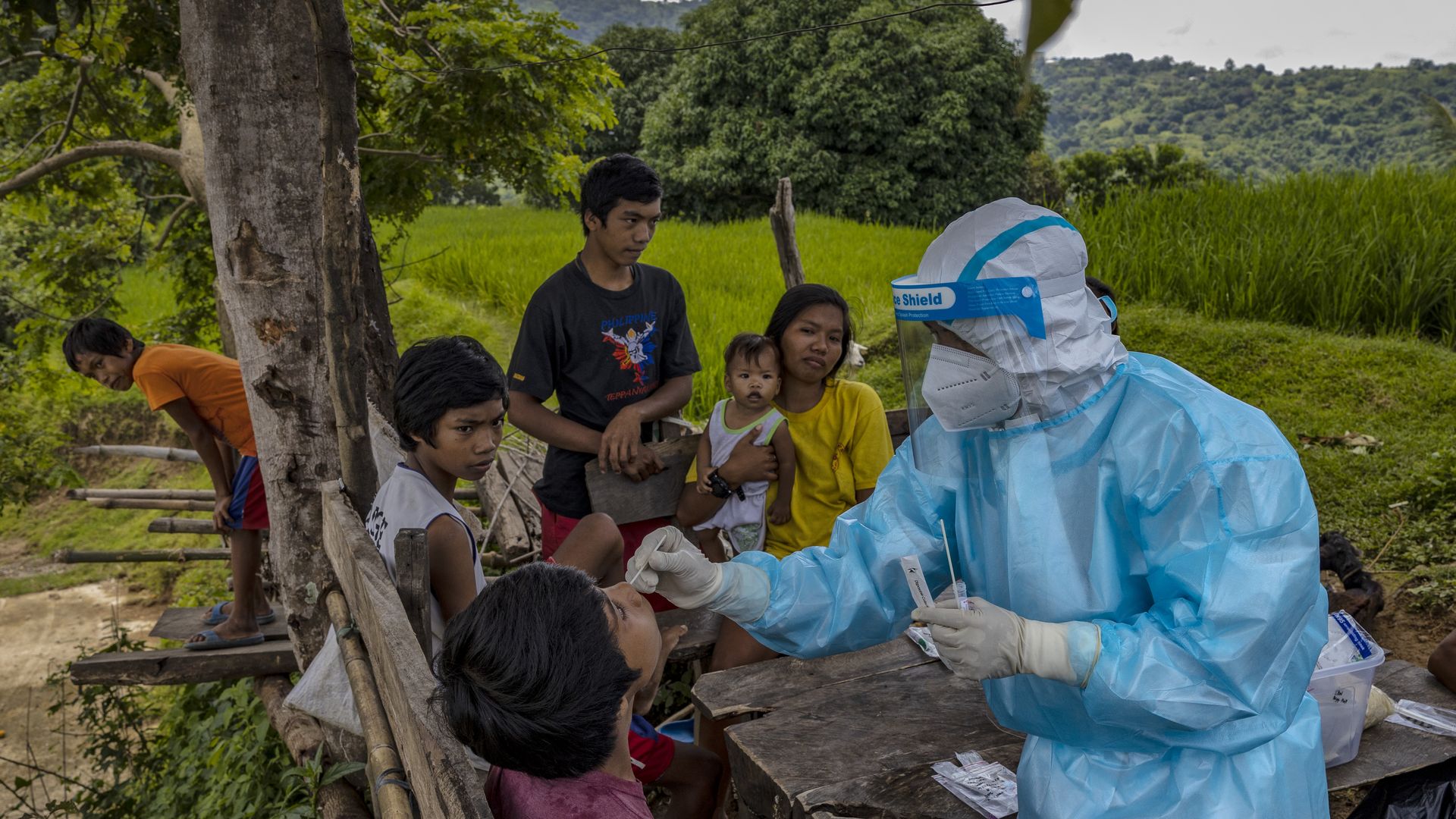| | | | | | | Presented By Discovery, Inc. | | | | Axios World | | By Dave Lawler ·Sep 13, 2021 | | Welcome back to Axios World. - Tonight's edition (1,637 words, 6 minutes) is our lucky 338th issue, which I'm sharing only because I took the trouble to add them up. Thanks to readers old and new.
- New arrival? Subscribe
Situational awareness: Biden will host the leaders of Australia, India and Japan at the White House on Sept. 24 — the first time the leaders of the "Quad" countries will gather for an in-person summit, the White House announced today. | | | | | | 1 big thing: Are we too focused on terrorism? |  | | | Photo illustration: Sarah Grillo/Axios. Photos: Wakil Kohsar, Chris Hondros/Getty Images | | | | Michael Morell was President George W. Bush's CIA briefer on Sept. 11, 2001. Flashback: Bush's interjection during a pre-9/11 briefing on al-Qaeda from Morell — "OK Michael, you've covered your ass" — has been cited as evidence that the White House hadn't taken the threat to the homeland seriously enough. - After 9/11, the War on Terror consumed the attention of virtually the entire U.S. national security apparatus, shoving aside other foreign policy priorities and changing the way we lived at home.
- I asked Morell if the post-9/11 fixation on counterterrorism went too far.
What he's saying: "When people are trying to kill you, literally trying to kill you, it's hard not to put most of your focus there, maybe even more focus than you should," Morell said in a phone interview. - "We reacted the way we did because 3,000 people had died and we didn't want that to happen again." Still, he adds, "maybe too many resources went to counterterrorism."
- "The consequence of it is that we let our peer competitors catch up to us in significant ways. China and Russia kind of went to school on us in terms of how we fight, and developed weapons systems that make it more difficult for us to fight the way we usually fight."
- "So as we spent 20 years fighting counterterrorism and a related counterinsurgency war — we were focused on that, they were focused on us. And they closed the gap considerably."
Even a decade after 9/11, when he was deputy CIA director and President Barack Obama was attempting to pivot to Asia, counterterrorism was "the No. 1 priority, without a doubt," Morell says. - The agency was able to deal with other priorities — Iran, North Korea, cybersecurity — on a day-to-day basis, Morell says, but still "didn't shift enough resources."
President Biden contends that leaving Afghanistan will help free the U.S. up to focus on China. - But he plans to continue to conduct operations against terror suspects in Afghanistan, just as the U.S. does in Somalia, the Sahel region, Syria, Yemen and elsewhere.
- David Petraeus, the former military commander in Afghanistan and CIA chief, tells Axios that the U.S. has moved on from the sorts of massive counterinsurgency campaigns required to truly defeat extremist groups.
- Instead, he argues, the key is to work with partner forces on the ground and employ surveillance and air support to continually degrade groups operating in hotspots around the world. As long as you can keep costs and casualties down, Petraeus says, "the public is largely ambivalent to extended overseas commitments."
In other words, the "forever wars" will continue, on a smaller scale, and the U.S. will keep one eye on jihadi groups even as it turns its attention to emerging challenges. |     | | | | | | 2. Part II: Terror prolongs the war |  | | | Biden, Obama and Bush. Photo: Charles Ommanney/Getty Images | | | | The arguments against such an approach extend well beyond the need to elevate other priorities. - Some worry that a permanent state of war, based on a 20-year-old blank check from Congress, is warping U.S. democracy. It has certainly affected the way millions of people around the world view America, and it motivated some to join extremist groups themselves.
- The deaths of 10 Afghans in a U.S. drone strike in Kabul on Aug. 29 highlight the continued risk of civilian casualties.
- Then there's the argument that when it comes to terrorism, the response is wildly disproportionate to the threat itself, given the tiny fraction of the U.S. population affected.
Morell and Petraeus both make the case that targeting terror groups overseas reduces their ability to organize attacks against the homeland. Left to their own devices, they argue, groups like al-Qaeda and ISIS will reconstitute and expand their ambitions. - The more such groups are allowed to flourish in places like Afghanistan, Petraeus contends, the higher the "security tax" Americans will pay at home (think TSA or badged entry in office buildings).
- Polls also suggest that terrorism is a top national security concern for Americans, Seth Jones of the Center for Strategic and International Studies tells Axios' Zach Basu.
- "For everybody that points to, 'Well there are more people that die in bathtubs or car accidents,' that may be true, but there's not the fear that goes with those kinds of deaths as it does with terrorism," Jones says. That makes it hard for political leaders to ignore.
The bottom line: "Did we overreact? Maybe. Yeah, maybe," Morell reflects. "But it's understandable why that happens." |     | | | | | | 3. State of the outbreak: America lags behind |  Data: Our World in Data; Chart: Axios Visuals 1. The U.S. now has the lowest vaccination rate of any G7 country, per Our World in Data. - By the numbers: Japan had given at least one dose to just 4% of its population four months ago, vs. 46% in the U.S. Now Japan is at 63% and the U.S. at 62%. Canada leads the way at 75%.
2. Israel is preparing for a potential second round of booster shots, though the government hopes it won't be necessary for some time. - Why it matters: If rich countries continue to stockpile doses to use as boosters — particularly additional rounds of boosters — it will prolong the first wave of vaccination in developing countries.
- Pfizer and Moderna continue to prioritize more profitable sales to rich countries, Axios' Bob Herman reports. Unsurprisingly, both are promoting boosters, but some experts continue to make the case that a third dose isn't necessary at this time.
3. Former French Health Minister Agnès Buzyn has been indicted for "endangering the lives of others" due to her response to the pandemic. - In other news... France granted citizenship to 12,000 COVID front-line workers this week in a show of gratitude for their efforts and sacrifices.
4. The U.K. government has reversed course, under political pressure from the right, and will abandon plans to implement vaccine passports for nightclubs and other large, crowded events. 5. Denmark has lifted all coronavirus restrictions after 18 months, apparently the first EU country to do so, thanks to a high vaccination rate and low case count. |     | | | | | | A message from Discovery, Inc. | | U.S. business interests and democratic values are at risk in Poland | | |  | | | | Discovery, Inc. owns Poland's highest-rated, last remaining independent news channel, TVN24. It's under attack by Poland's ruling government. Bi-partisan members of Congress support the protection of free speech and media in Poland. Take action today. Sign a petition. Raise your voice. | | | | | | Bonus: Where in the world? |  | | | Screengrab via Apple Maps | | | | Today we're visiting the five cities marked above, three of which are among the 10 largest cities in the world. Hint: All five cities are in different countries, and while they are not the five biggest cities within the confines of this map, they are the biggest cities from each country within the map area. Can you name all five? Scroll to the bottom for the answer. |     | | | | | | 4. Data du jour: Biden's empty ambassadorships |  Data: Center for Presidential Transition via Congress.gov, historical data provided by the Partnership for Public Service; Chart: Will Chase/Axios The Senate has confirmed just two of President Biden's ambassadorial nominations, far behind the 56 confirmed envoys President Obama had at this stage, Axios' Hans Nichols writes. Sen. Ted Cruz (R-Texas) has been preventing most ambassadors from moving to the floor for a vote to pressure the administration to impose sanctions on Russia's Nord Stream 2 pipeline. - Just 1 in 4 other national security positions at the Pentagon and Departments of Justice and State are filled.
- That compares with 57% of positions filled at the time of the Sept. 11 attacks in 2001.
|     | | | | | | 5. Global news roundup |  | | | Støre (L) will likely replace Solberg (R) as prime minister. Photo: Kyrre Lien/Bloomberg via Getty | | | | 1. Center-left parties in Norway are set for a runaway election victory, with the Labor Party's Jonas Gahr Støre likely to replace Conservative Erna Solberg as prime minister after eight years in power. - State of play: With three-quarters of the vote counted, three center-left parties are poised to win a parliamentary majority without needing to bring in the Greens, who want to rapidly accelerate the transition away from an oil-driven economy.
2. A snap poll suggests a plurality of Germans thought Social Democratic leader Olaf Scholz won last night's debate, solidifying his front-runner position ahead of the Sept. 26 election. - Remarkably, there was not a single question about foreign affairs.
3. Lebanon finally has a government, but the crisis is far from over. 4. The latest from Afghanistan: Secretary of State Tony Blinken defended the Biden administration's Afghanistan withdrawal today before the House Foreign Affairs Committee, with some Republican interrogators calling on him to resign. He faces another hearing in the Senate tomorrow. Go deeper. |     | | | | | | 6. What I'm reading: Evidence of an airstrike gone horribly wrong | | The Biden administration said an airstrike in Kabul on Aug. 29 successfully eliminated an imminent threat to the U.S. forces securing the airport. - The Pentagon has consistently refused to say who the target was or who was killed.
- According to a detailed and damning NYT investigation, it appears to have targeted an aid worker who was deemed suspicious for loading supplies into his car and visiting a possible ISIS safe house. The Times retraced his steps and found only evidence of a normal workday.
- 7 of the 10 civilians killed were children. The NYT discovered no evidence of the "secondary explosion" the Pentagon has cited as evidence that there were explosives in the car.
Between the lines: The White House cited the strike as evidence that its "over the horizon" counterterrorism strategy would allow it to degrade terror groups in Afghanistan. Instead, it may be evidence of the danger posed to Afghan civilians. |     | | | | | | 7. Stories we're watching |  | | | Contact tracing in Aringay, Philippines. Photo: Ezra Acayan/Getty | | | - Inside Biden's call with Xi
- North Korea tests "strategic" cruise missiles
- Founder of Peru's Shining Path guerrilla group dies
- Iran and UN watchdog reach deal on nuclear monitoring
- Al-Qaeda leader appears in new video on 9/11 anniversary
- U.S. removes missile defenses from Saudi Arabia
- Nord Stream 2 pipeline is complete
Quoted: "In terms of the homeland, the threat right now from terrorist groups, we don't prioritize at the top of the list Afghanistan. What we look at is Yemen, Somalia, Syria and Iraq for ISIS. And that's where we see the greatest threat." — Director of National Intelligence Avril Haines today |     | | | | | | A message from Discovery, Inc. | | Poland's last remaining independent news channel is under attack | | |  | | | | There is an effort in Poland to stop the country's highest-rated independent news channel: TVN24. Why it's important: This new law would allow the government to control the media, curb free speech and will impact future decisions by U.S. investors. Raise your voice. Sign the petition. | | | | Answers: Beijing (1), Pyongyang (2), Seoul (3), Tokyo (red pin), Vladivostok (purple pin), by far the smallest of this set but a major Russian port city. |  | | It'll help you deliver employee communications more effectively. | | | | | | Axios thanks our partners for supporting our newsletters. If you're interested in advertising, learn more here.
Sponsorship has no influence on editorial content. Axios, 3100 Clarendon Blvd, Suite 1300, Arlington VA 22201 | | | You received this email because you signed up for newsletters from Axios.
Change your preferences or unsubscribe here. | | | Was this email forwarded to you?
Sign up now to get Axios in your inbox. | | | | Follow Axios on social media:    | | | | | |












No comments:
Post a Comment